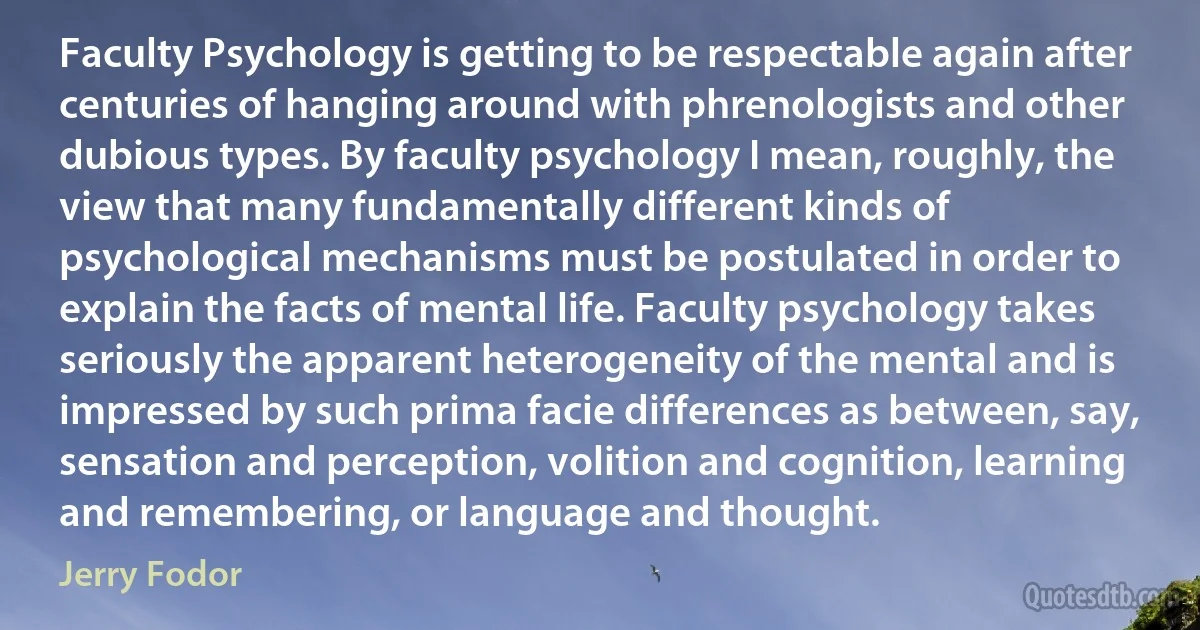Jerry Fodor quotes
Jerry Fodor was an influential American philosopher and cognitive scientist, renowned for his work on the philosophy of mind and language. A leading proponent of the modularity of mind and the language of thought hypothesis, his ideas deeply shaped modern cognitive science. He is remembered for his rigorous arguments and impactful theories about mental representation. Here are 10 of his quotes:
Suppose that the organism is given the problem of determining the analysis of a stimulus at a certain level of representation - e.g., the problem of determining which sequence of words a given utterance encodes. Since, in the general case, transducer outputs underdetermine perceptual analyses, we can think of the solution of such problems as involving processes of nondemonstrative inference. In particular, we can think of each input system as a computational mechanism which projects and confirms a certain class of hyputheses on the basis of a certain body of data.

Jerry Fodor
[T]he degree of confirmation assigned to any given hypothesis is sensitive to properties of the entire belief system ... simplicity, plausibility, and conservatism are properties that theories have in virtue of their relation to the whole structure of scientific beliefs taken collectively. A measure of conservatism or simplicity would be a metric over global properties of belief systems.

Jerry Fodor
From the point of view of semantics, errors must be accidents: if in the extension of "horse" there are no cows, then it cannot be required for the meaning of "horse" that cows be called horses. On the other hand, if "horse" did not mean that which it means, and if it were an error for horses, it would never be possible for a cow to be called "horse." Putting the two things together, it can be seen that the possibility of falsely saying "this is a horse" presupposes the existence of a semantic basis for saying it truly, but not vice versa. If we put this in terms of the crude causal theory, the fact that cows cause one to say "horse" depends on the fact that horses cause one to say "horse"; but the fact that horses cause one to say "horse" does not depend on the fact that cows cause one to say "horse"...

Jerry Fodor
Philosophers who have wanted to banish the ghost from the machine have usually sought to do so by showing that truths about behavior can sometimes, and in some sense, logically implicate truths about mental states. In so doing, they have rather strongly suggested that the exorcism can be carried through only if such a logical connection can be made out. ... [O]nce it has been made clear that the choice between dualism and behaviorism is not exhaustive, a major motivation for the defense of behaviorism is removed: we are not required to be behaviorists simply in order to avoid being dualists.

Jerry Fodor
If people differ in an absolutely general way in their estimations of epistemic relevance, and if we follow the holism of meaning and individuate intentional states by way of the totality of their epistemic bonds, the consequence will be that two people (or, for that matter, two temporal sections of the same person) will never be in the same intentional state. Therefore, two people can never be subsumed under the same intentional generalizations. And, therefore, intentional generalization can never be successful. And, therefore again, there is no hope for an intentional psychology.

Jerry Fodor
When taken as a way of modeling cognitive architecture, connectionism really does represent an approach that is quite different from that of the classical cognitive science that it seeks to replace. Classical models of the mind were derived from the structure of Turing and Von Neumann machines. They are not, of course, committed to the details of these machines as exemplified in Turing's original formulation or in typical commercial computers-only to the basic idea that the kind of computing that is relevant to understanding cognition involves operations on symbols.. In contrast, connectionists propose to design systems that can exhibit intelligent behavior without storing, retrieving, or otherwise operating on structured symbolic expressions. The style of processing carried out in such models is thus strikingly unlike what goes on when conventional machines are computing some function.

Jerry Fodor
Jerry Fodor
 Occupation: American Philosopher
Occupation: American Philosopher
Born: April 22, 1935
Died: November 29, 2017
Quotes count: 10
Wikipedia: Jerry Fodor










